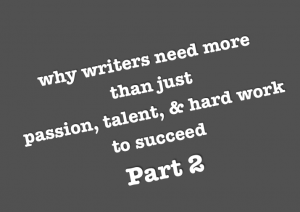PART ONE discusses the first half of Malcolm Gladwell’s book Outliers and how it applies to writers More than just passion, hark work, and talent is needed to be successful. Other factors are involved. Part Two looks at the 2nd half of his book.
To really succeed at writing you need more than just passion, talent, and hard work. Other factors come into play, some absolutely positively out of your control. And some that are.
Harlan, Kentucky: Gladwell tells the reader where and why a feuding mentality comes from ( think sheep herding, grazing boundaries, blood feuds, the Hatfield and McCoys ) . How is can this possibly be applicable to writing? Do you come from a culture or family who feuds? Or where retaliation and ‘talking smack’ and ‘pay back’ is a family favorite pastime? Does this attitude leak on to your social media? Too many folks are too quick to lash out on social media, too prone to retaliatory attacks ( remember the debacle with the author who responded to a mean reviewer?) Each nasty comment erodes your platform. Agents and editors often google you to see how you project yourself. A mean spiteful,
cranky person will be viewed as difficult to work with. Projecting that image may be lethal to your career. What editor wants to work with a newbie writer who lashes out and engages in verbal brawls with followers and “friends.” What publisher wants to take a chance on a debut author who can’t be counted on to be polite and non-judgmental during guest blogs and speaking tours. Stay classy, my friends.
The Ethnic Theory of Plane Crashes: Culture determines how we interact people, whether we defer to elders, question authority, or speak in a straightforward manner. We are affected by our culture’s etiquette and expectations. The publishing business has its own set of standards. Do you know what they are? A quick look at an agent’s twitter feed will provide some clues. Don’t shove your manuscript under the bathroom stall at me. Don’t pitch or ask me questions on twitter or Facebook ( unless it’s a via an established #pitch designated time ). Follow the f**%#! guidelines for submitting queries on my website. When is it OK to break those rules? Mmmm, not sure, but I’m certain a few people have stories where it all worked out for the best.
If you come from a culture or family that observes a more passive approach to conversation then you will certainly have to practice pitching skills during a conference or when writing a query. On the other hand, if you come from a culture/family that is overbearing, too loud, and tends to embellish and exaggerate then you ought to be mindful that your tone isn’t bombastic and off-putting.
Rice Paddies and Math Tests; No, writing is not math. Except when it is. Publishers look at comps and totals and trends and earning potential. That’s math. And you can’t control that. You can, however, figure out optimal times for RTs, Likes, and Shares. Information can also be found for most searched key words, hashtags, and genres. Before shelling out money for self-publishing programs or gimmicks or ads you definitely need to do some number crunching.
Another aspect of the Rice chapter was one’s ability to stick with a problem. Gladwell gives us some common rice-culture quotes: No food without blood and sweat. If a man works hard, the land will not be lazy.
How long do you preserver to tackle a plot, character, or an editing problem? I find most folks settle for “good enough.” Well, good enough ain’t good enough to land an agent.
Marita’s Bargain: Studies show that those who are disadvantaged can succeed given time, resources, and opportunities. Let’s apply that to writing. Many of us have some disadvantage to contend with. Maybe its culture or education or lack of resources. Maybe you don’t hang with a literary crowd or haven’t found a serious writing group. Maybe you have no friends in the biz to give you advice. Maybe you get zero emotional support from family or friends. Maybe you can’t afford to replace your ancient computer. Maybe squeezing in a few hours of writing during the week is all you can manage. Maybe you need to give up something ( like activities that suck away precious writing time). Not all of us have the same time, resources, and opportunities—and that’s something we cannot change.
So where does all this leave a struggling writer?
Well, we know publishers don’t like to take chances—can’t blame them, it is a business after all. Many—possibly most—writers will never ever get a lucky break or an opportunity. And that sucks!
There are other options. Self-publishing gets a book ‘out there’, unfortunately it takes lots of money, friends, time, marketing savvy, and advertising tactics to make a book more than an Amazon blip. Most of us don’t have tons of cash to drop on promotion sites, don’t know 100 people who will leave reviews or have the time and know-how to devise marketing strategies.
Below are some questions you might want to ask yourself to determine your odds for success. ( My apologies to Malcolm Gladwell for adapting Outliers for struggling writers and creating this too-simplistic Q & A.) How many YES’s do you have?
- Do you have have a supportive family?
- Do you have supportive friends ( preferably ones who enjoy reading) ?
- Do you have a career in publishing or journalism?
- Are you a member of a writing group ( not club ) with published ( not indie ) authors?
- Can you function and think creatively on little sleep? ( for those with day jobs )
- Are you smart enough?
- Are you smart enough and have superior people skills?
- Do you have a creative mind?
- Do you come from a family that stresses the importance of hard work and perseverance?
- Is your genre trending or is it the hot new thing?
- Does writing make you happy? Really truly bring-a-smile-to-your-face happy?
- Does writing make you happy when you know there’s a chance you will never see a financial reward?
- Happy enough that a completed novel is reward enough?
- Do you come from a culture that stresses the importance of determination, effort, and perseverance?
- Do you have a willingness to step out of your cultural and/or personal comfort zone?
- What sacrifices are you willing to make to achieve your goal?
- What lucky break or opportunity do you need?
Knowing your roadblocks is helpful, offers a realistic perspective and, if you’re smart, compels you to find ways to change, minimize, or correct those disadvantages that may be an impediment to your success.
Naturally, we can’t change what we can’t change ( so profound, right? ) but we can do our best to change what we can and then cross our fingers for the rest.
In the words of Winston Churchill. Never, never, never, never give up.
Related posts: Readin’ & Writin’; Rock Your Writing















